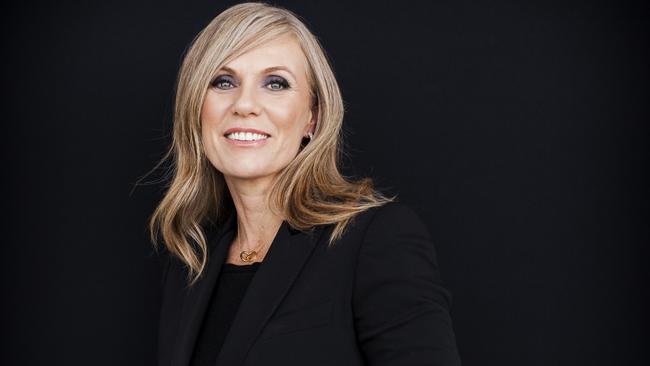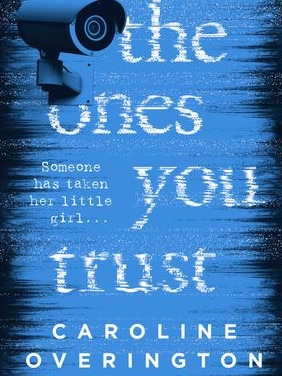The Ones You Trust, Caroline Overington; TV, social media morality
With this missing-child plot comes satirical scrutiny of the TV and social-media industries and the conduct they elicit and reward.

A missing child is the kind of human-interest story we all notice, however much we deplore clickbait and tabloid journalism. English authors, especially, have created a whole subgenre of fictions featuring child abductions since the disappearance of three-year-old Madeleine McCann in 2007.
As a long-time journalist and prize-winning author of nonfiction and fiction, Caroline Overington is well placed to contribute an Australian equivalent.
In The Ones You Trust she delivers a narrative recounting in hour-by-hour detail of the police investigation, media rescue campaign and domestic repercussions that follow the apparent abduction of a television celebrity’s little daughter. This activity propels the novel through to an Overington specialty, a couple of closing flips worthy of an Olympic gymnast.

With the plot comes satirical scrutiny of the TV and social-media industries and the conduct they elicit and reward. Viewed retrospectively, then, the novel looks more like a morality tale than a mystery thriller. So long as the word “corrupted” continues to resonate after the closing sentence, the reader is prompted to think about the leading characters’ values and tradecraft.
Emma Cardwell, mother of the snatched child, is a former news reporter with conservative rural origins who presents a commercial breakfast show, Cuppa, for Stellar Network TV. Her job requires early starts, devotion to trawling social media sites, and a constant effort to remain slim and perfectly groomed.
This “good girl” must maintain an animated, “bright and light” demeanour along with a capacity for quick, appropriate responses. These traits are reflected in the prose style Overington uses here to tell her tale.
On air Emma and her co-host, ageing player PJ Peterson, banter with the Gadget Guy and effusive kitchen segment presenters. When ratings dip there are more frequent appearances by a giant, speechless rabbit tasked with showering hard-luck guests with cash.
Outside the studio, Emma requires a driver cum bodyguard to protect her from paparazzi, stalkers and crazy fans. At home she possesses much that others would envy: a lasting marriage, three thriving children, paid help, and a house that’s “gracious and beautiful”.
Emma is a credible name for a middle-class, middle-aged woman in contemporary Sydney. But might there be an authorial nod to a couple of 19th-century Emmas too: Jane Austen’s Emma Woodhouse and Gustave Flaubert’s Emma Bovary? One merely has to recall Austen and Flaubert’s clear-eyed treatment of their Emmas and the societies they inhabit to suspect Overington’s judgment is not impaired by her creation’s charms.
In previous novels Overington,who is also an associate editor of The Australian, has cast a sharp eye over the individualism and aspirational, materialist cultures of North America and Australia. Her titles reflect characters’ hopes but also the uncertainties of any outcomes. Who will get lucky, who will get away with which transgression?
Family and sexual entanglements carry plots, and a few untimely deaths occur, but essentially the novels are about the gaining of wealth and the autonomy it can facilitate.
As one young man asserts in The Lucky One (2017), “Rich versus not rich. I choose rich”, while an older woman advises a younger one, “Money is everything … if you have it, you can make choices.” The voices of those who disagree are less compelling.
Overington is on to something here, for why sentimentalise the modestly good and terminally poor when aspirants to wealth are so much more energetic and enterprising? She portrays these men and women of all generations with just enough sympathetic insight to hook us.
Flaubert used a subtitle referring to “provincial ways”. The communities of Overington’s fictions are provincial places in the sense that they are in the postcolonial world and her (mostly Causcasian) people are aware of their Old World heritage.
Her Emma aspires to move to London as a reporter if she can get away. Golden handcuffs and intellectual complacency have stalled her: “Twelve years of 3am starts. Twelve years of gasping at gadgets and talking to a mute rabbit.”
Emma’s driver is described as living in a house in “Shitsville. Over the bridge. Dingy joint.” Such households constitute the mass audiences to whom Stellar broadcasts.
The inhabitants of the high ground can look pathetic too, their pretension and self-indulgence bemusing. Remarking on the names of Emma’s children, the coarse Jock, head of Stellar, says: “Fox, Seal, what have they got, a f..king farmyard?”
Jock’s deputy, Maven, is so buoyed by the TV numbers pulled in by the abduction that she is prone to forget she is meant to be solicitous in the distraught parents’ presence. Maven is a marvellous character, a scene stealer. As “the most powerful woman in TV land”, she is forever swinging into action or holding firm while posing in expensive shoes and smoking a coloured cigarette extracted from a gold case.
There are poignant minor players too.
Anticipating a ransom demand, Roaring Leo the Gold Coast nickel heir appears offering a briefcase of cash; but when the demand comes it is for $1 million in Bitcoin. Emma’s predecessor, Bunny Tasker, is encountered spruiking vitamins. She appears well preserved (“big smile, tight face, yellow beehive”) but speaks with “ferocity” of working for Stellar for 25 years, forgoing having children until she reached her use-by date. For his spot on a TV special, doddering, incontinent Brian, the original Cuppa host, is transformed into “something like a ship’s captain”. Who can you trust when so much in this commercial world is about appearances and spin?
Robyn Walton is a writer and critic.
The Ones You Trust
By Caroline Overington
HarperCollins, 330pp, $29.99



To join the conversation, please log in. Don't have an account? Register
Join the conversation, you are commenting as Logout